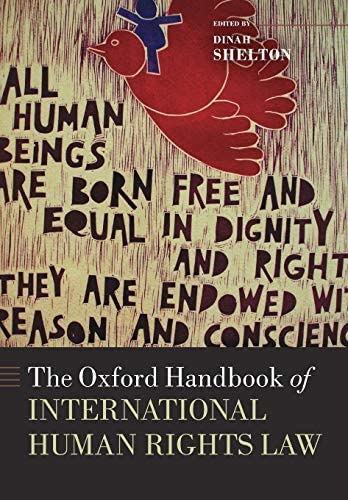Newly released
This book is new and will be uploaded as soon as it becomes available to us and if we secure the necessary publishing rights.

The Oxford Handbook of International Human Rights Law Book PDF
(0)
Author:
Dinah SheltonNumber Of Reads:
70
Language:
English
Category:
Social sciencesSection:
Pages:
839
Quality:
good
Views:
1222
Quate
Review
Save
Share
New
Book Description
The Oxford Handbook of International Human Rights Law provides a comprehensive and original overview of one of the fundamental topics within international law. It contains substantial new essays by over forty leading experts in the field, giving students, scholars, and practitioners a complete overview of the issues that inform research and a "map" of the debates that animate the field. Each chapter features critical and up-to-date analysis of the current state of debate and discussion, assessing recent work, and advancing the understanding of all aspects of this developing area of international law.
Addressing all aspects of international human rights law, the Handbook consists of over forty chapters, divided into seven parts. The first two sections explore the foundational theories and the historical antecedents of human rights law from a diverse set of disciplines, including the philosophical, religious, biological, and psychological origins of moral development and altruism, and sociological findings about cooperation and conflict. They also trace the historical sources of human rights through comparative and international law by conducting a case study of the anti-slavery movement. Section III focuses on the law-making process and certain categories of rights. Sections IV and V examine the normative and institutional evolution of human rights, and discuss its impact on various doctrines of general international law. The final two sections are more speculative, examining whether there is an advantage to considering major social problems from a human rights perspective and, if so, how that might be done. Section VI analyses several current problems that are being addressed by governments both domestically and through international organizations, and issues that have been placed on the human rights agenda of the United Nations, such as state responsibility for human rights violations and economic sanctions to enforce human rights. The final section then evaluates the impact of international human rights law over the past six decades from a variety of perspectives.
The Handbook will be an invaluable resource for scholars, students, and practitioners of international human rights law. It provides the reader with new perspectives on international human rights law that are both multidisciplinary and geographically and culturally diverse. It should become the new standard reference work in this area.
Dinah Shelton
Dinah L. Shelton joined the law school faculty in 2004. Before her appointment, she was professor of international law and director of the doctoral program in international human rights law at the University of Notre Dame Law School from 1996-2004. She previously taught at Santa Clara University and was a visiting lecturer at the University of California, Davis, Stanford University, University of California, Berkeley, the University of Paris, and the University of Strasbourg, France. From 1987 to 1989, she was the director of the Office of Staff Attorneys at the U.S. Court of Appeals for the Ninth Circuit.
Professor Shelton is the author or editor of three prize-winning books: Protecting Human Rights in the Americas (winner of the 1982 Inter-American Bar Association Book Prize and co-authored with Thomas Buergenthal); Remedies in International Human Rights Law (awarded the 2000 Certificate of Merit, American Society of International Law); and the three volume Encyclopedia of Genocide and Crimes against Humanity (awarded a “Best Research” book award by the New York Public Library). She also has authored many articles and books on international law, human rights law, and international environmental law. She is a member of the board of editors of the American Journal of International Law and is a vice-president of the American Society of International Law.
Professor Shelton serves on the boards of many human rights and environmental organizations. In 2006, she was awarded the prestigious Elizabeth Haub Prize in Environmental Law, and has served as a legal consultant to the United Nations Environment Programme, UNITAR, World Health Organization, European Union, Council of Europe, and Organization of American States. In 2009, she became the first woman nominated by the United States to become a member of the Inter-American Commission on Human Rights, established by the Organization of American States to promote and protect human rights in the Western Hemisphere. She served a four-year term, during which she went on to become President of the Commission.
Read More
Book Currently Unavailable
This book is currently unavailable for publication. We obtained it under a Creative Commons license, but the author or publisher has not granted permission to publish it.
Rate Now
5 Stars
4 Stars
3 Stars
2 Stars
1 Stars
The Oxford Handbook of International Human Rights Law Quotes
Top Rated
Latest
Quate
Be the first to leave a quote and earn 10 points
instead of 3
Comments
Be the first to leave a comment and earn 5 points
instead of 3